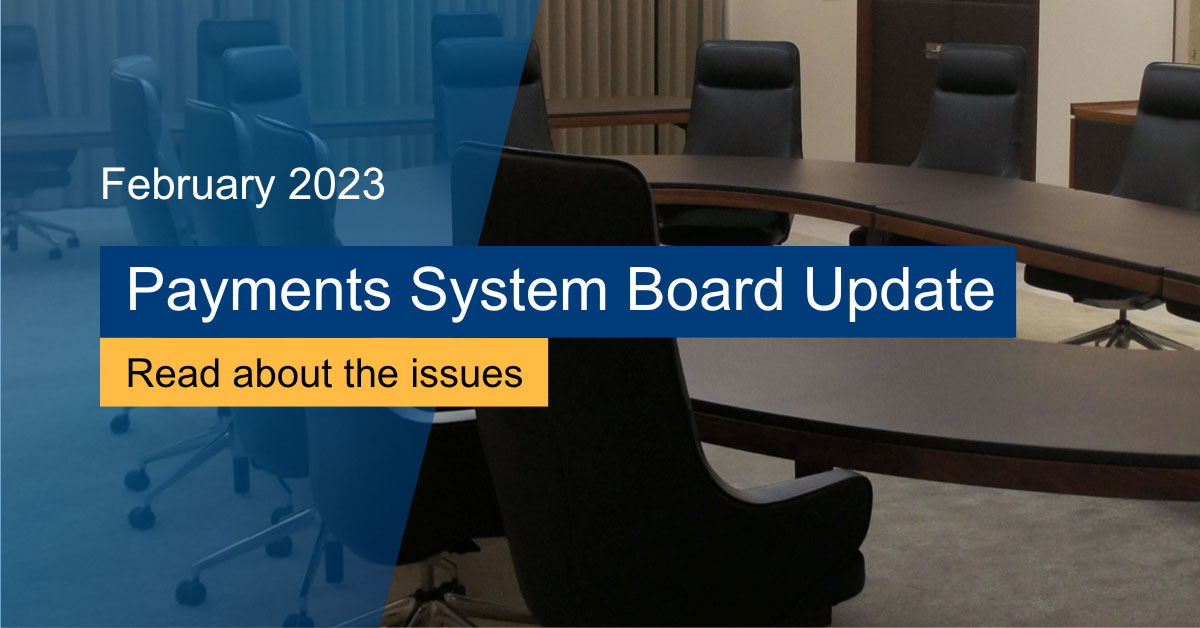Payments System Board Update: February 2023 Meeting

At its meeting today, the Payments System Board discussed a number of issues, including:
- ASXs self-assessment against the Financial Stability Standards (FSS). The ASX has conducted its first self-assessment following an earlier recommendation by the Bank. The results will be incorporated into the Banks ASX assessment later this year. The Bank expects the ASX to maintain and invest in the current CHESS system for equities clearing and settlement until a new system is successfully implemented.
- Payment system safety and resilience. The Bank supervises or oversees the safety and stability of payment systems that are systemically important, since they handle high-value payments for key financial market infrastructures. The Board agreed to extend this supervision to include payment systems where an outage could cause significant economic disruption and damage confidence in the financial system. At a minimum, this would include the payment systems that the Government has declared to be critical infrastructure (the New Payments Platform, Visa, Mastercard and eftpos). The Bank will consult with industry on the development and implementation of the updated framework, which would focus on the effectiveness of the risk management framework and operational risk.
- Payments system regulatory reform. The Board discussed the Governments development of a strategic plan for the future of Australias payments system and welcomed the Governments planned update of payments system legislation. This update will include modernising the Payment Systems (Regulation) Act 1998 and introducing a new licensing framework for payments service providers. These reforms will help to ensure that Australias regulatory regime is fit for purpose and flexible enough to respond to the fast-changing world of payments.
- The future of the cheque system. Members discussed industry efforts to manage the decline in the cheque system amid the ongoing reduction in cheque use. The Board discussed the high cost of maintaining the cheque system and the increased availability of alternative payment options. The Bank will continue to work with financial institutions and the government to support the further transition away from cheques.
- The future of the Bulk Electronic Clearing System (BECS). BECS has been a reliable and low-cost workhorse of the Australian payments system for many years, and is still heavily relied on by businesses and governments. The infrastructure is, however, aging and the New Payments Platform (NPP) offers a more modern alternative. The Board supports the industrys discussions on how the BECS system could be retired. This includes consideration of how to ensure that there are viable alternatives for all BECS transactions and how to support end-users during any transition. As part of this effort, it is important that industry continues to enhance the capability of the NPP and work towards making all accounts that send or receive payments reachable via the NPP. The Bank expects industry participants to meet their commitments and will require financial institutions to report to the Bank on their work to connect all relevant accounts to the NPP.
- International and domestic work on central bank digital currency (CBDC). Members discussed the ongoing research on CBDCs, including the project currently underway in Australia with industry participants exploring use cases for a CBDC. A number of use cases will be tested as part of the live pilot over the coming months. A report on the project is expected to be published around the middle of the year.
- The technology outage at the Reserve Bank on 12 October that disrupted the payments system. The Bank has commissioned an external independent review into the incident and the Banks operational risk environment with respect to the Reserve Bank Information and Transfer System (RITS). The Board will discuss the report and the Banks response later in the year. The Bank has also started publishing quarterly operational reliability statistics for its payment settlement services – these statistics are available at: System Availability Statistics – 2022 | RBA.

